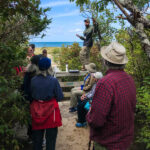Please Note: This event has expired.

New York Times bestselling author and acclaimed presidential historian Douglas Brinkley chronicles the rise of environmental activism during the Long Sixties (1960-1973), telling the story of an indomitable generation that saved the natural world.
With the detonation of the Trinity explosion in the New Mexico desert in 1945, the United States took control of Earth’s destiny for the first time. After the Truman administration dropped atomic bombs on Japan to end World War II, a grim new epoch had arrived. During the early Cold War years, the federal government routinely detonated nuclear devices in the Nevada desert and the Marshall Islands. Not only was nuclear fallout a public health menace, but entire ecosystems were contaminated ... view more »
ADMISSION INFO
Ticket options range from free to $20 for reserved seat + reception.
Books available to pick up at event, or shipped.
Live broadcast option.
Phone: (508) 790-3077
Email: jennifer@jfkhyannismuseum.org
Website: https://jfkhyannismuseum.org/event/douglas-brinkley/
INDIVIDUAL DATES & TIMES*
Additional time info:
Pre-purchased books are available for signing.
There will be a reception after the lecture with attendees who purchase Reserved Seat with Reception.
Reserved seating event. Live broadcast option is available.
LOCATION
PARKING INFO
Free parking behind museum, 2 hour free parking curbside on Main Street, Hyannis.













